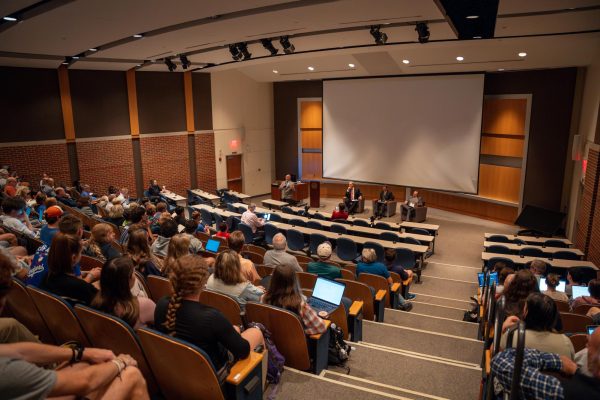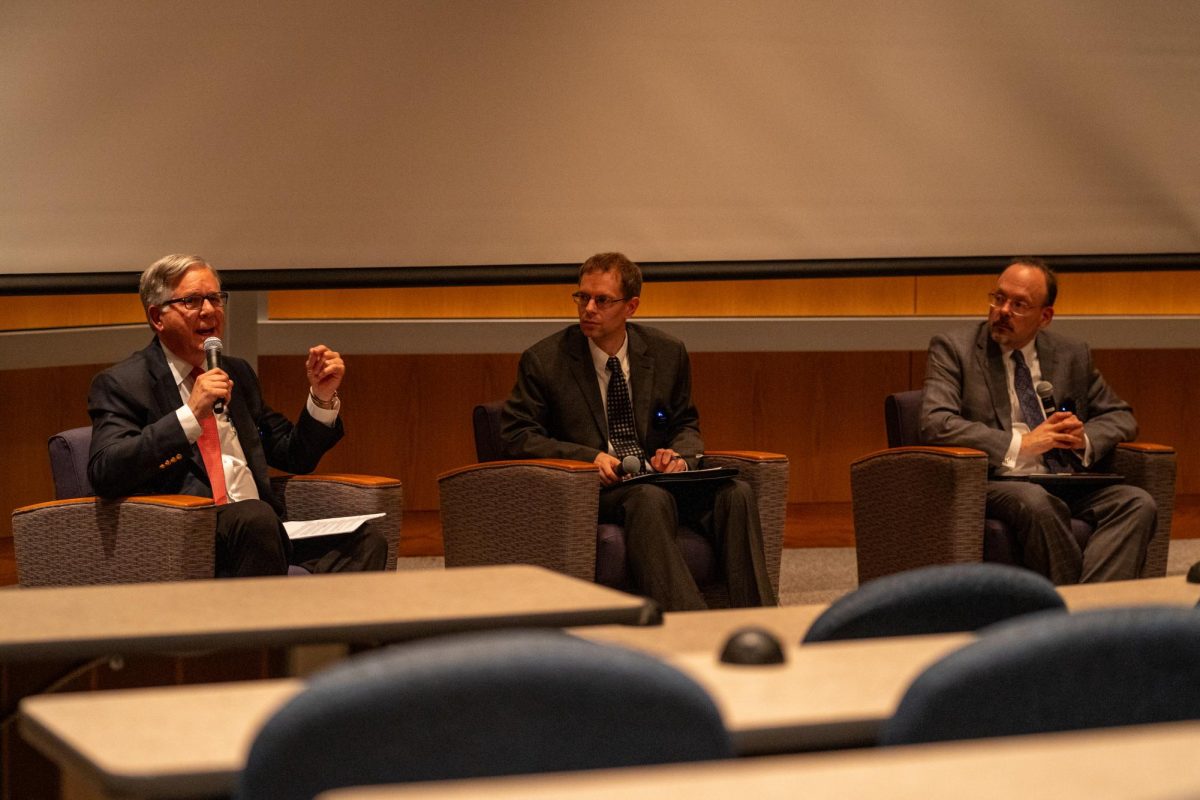University Heights, OH— On Monday, Sept. 30, John Carroll University students, faculty, staff and more gathered to hear about the upcoming United States Supreme Court term. Pete Wiliams, the university’s journalist in residence, and Jonathan Adler, J.D, legal scholar and law professor at Case Western Reserve University, led the discussion titled “Looking Behind, Peering Ahead – What’s Going on at the Supreme Court?” which focused on recent decisions and predictions for the upcoming term.
Williams covered the Justice Department and the Court for NBC News from 1993 until his retirement in 2022. Before starting his career at the news media giant in 1993, he served as press secretary for Rep. Dick Cheney, later becoming the assistant secretary of defense for public affairs following Cheney as he became United States secretary of defense in 1989.
Adler currently serves as the founding director of the Coleman P. Burke Center for Environmental Law at the CWRU School of Law, in addition to teaching courses in environmental, administrative and constitutional law. His specialty is making sense of the U.S. Supreme Court.

This event was the informal kick-off to Williams’ week-long residency at JCU, offering attendees expert insight and analysis on the Court’s recent term and predictions of where one of the most conservative courts in over a century may go in their upcoming term.
Colin Swearingen, who holds a doctorate in political science and is a professor at JCU, moderated the event. The discussion started with a look back at the landmark presidential immunity decision in Trump v. United States.
Williams called the six to three decision “the marquee case of the term.” The Court ruled presidents are immune from prosecution for their official acts while in office. The problem is that if prosecutors bring a case, they have to “thread the needle about which acts are not official or which are presumptively not immune.”
“The court gives us nothing to understand how it’s conceiving of what is core executive authority,” said Adler. “The Constitution never speaks of executive immunity, and that silence is conspicuous because [it] gives incredibly broad protection for legislators.”
Though Adler shied away from addressing the polarizing nature of the case, Williams said, “I think this was a political decision, not a legal one.” The Court was concerned with preventing future prosecution of former presidents by their successors. They “saw this coming, and they said, we want this to happen. We’re going to kill this,” he said.

Willaims predicted that if Trump were to win the 2024 presidential election, “the cases will go away and there won’t be anything to appeal, however, “if Kamala Harris wins the prosecution continues.” If that were the case, judges would be forced to make decisions about what is an official act and the Court could be forced to answer a “question they tried very hard not to answer.”
Swearingen transitioned the conversation to the 1984 Chevron ruling, which allowed courts to defer to federal agencies’ reasonable interpretations of ambiguous laws, giving them flexibility in implementation. Adler said administrations increasingly used this to push their agendas. Both panelists highlighted the Court’s recent ruling in Loper Bright Enterprises v. Raimondo, holding that agencies should act only within the powers granted by Congress.
Though Congress has failed to act in some cases, the Electoral Count Act is a recent bipartisan victory. Williams said, “It fixed a law that, by anybody’s reckoning, was one of the least clear, most disastrous statutes in the book.” The Act makes it harder to challenge a slate of electors from the state and defines the vice president’s power as essentially nonexistent.
Adler added that people mistakenly think 270 electoral votes are always required to win, but the actual requirement is a majority of votes cast. So if a state withholds its votes, it lowers the total needed to win, making it harder to affect the outcome unless a large number of votes are withheld.
Looking forward, Adler brought up an upcoming case involving whether states can ban certain medical treatments for youth with gender dysphoria, a case originating from the Sixth Circuit Court of Appeals. Williams added, “about half the states have similar laws that ban this kind of treatment, and one of them is Ohio.”
Williams also mentioned another case the Court will hear regarding the FDA’s ban on flavored e-cigarettes, the agency argues the products entice children while companies say it helps people quit smoking.
As the Court continues to address significant legal and social issues, its impact on American society remains a topic of close watch and discussion.


